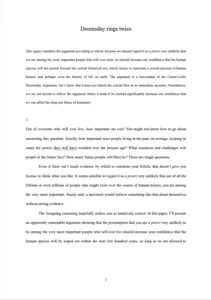Doomsday rings twice
Andreas Mogensen (Global Priorities Institute, Oxford University)
GPI Working Paper No. 1-2019
This paper considers the argument according to which, because we should regard it as a priori very unlikely that we are among the most important people who will ever exist, we should increase our confidence that the human species will not persist beyond the current historical era, which seems to represent a crucial juncture in human history and perhaps even the history of life on earth. The argument is a descendant of the Carter-Leslie Doomsday Argument, but I show that it does not inherit the crucial flaw in its immediate ancestor. Nonetheless, we are not forced to follow the argument where it leads if we instead significantly decrease our confidence that we can affect the long run future of humanity.
Other working papers
Shutdownable Agents through POST-Agency – Elliott Thornley (Global Priorities Institute, University of Oxford)
Many fear that future artificial agents will resist shutdown. I present an idea – the POST-Agents Proposal – for ensuring that doesn’t happen. I propose that we train agents to satisfy Preferences Only Between Same-Length Trajectories (POST). I then prove that POST – together with other conditions – implies Neutrality+: the agent maximizes expected utility, ignoring the probability distribution over trajectory-lengths. I argue that Neutrality+ keeps agents shutdownable and allows them to be useful.
The paralysis argument – William MacAskill, Andreas Mogensen (Global Priorities Institute, Oxford University)
Given plausible assumptions about the long-run impact of our everyday actions, we show that standard non-consequentialist constraints on doing harm entail that we should try to do as little as possible in our lives. We call this the Paralysis Argument. After laying out the argument, we consider and respond to…
Quadratic Funding with Incomplete Information – Luis M. V. Freitas (Global Priorities Institute, University of Oxford) and Wilfredo L. Maldonado (University of Sao Paulo)
Quadratic funding is a public good provision mechanism that satisfies desirable theoretical properties, such as efficiency under complete information, and has been gaining popularity in practical applications. We evaluate this mechanism in a setting of incomplete information regarding individual preferences, and show that this result only holds under knife-edge conditions. We also estimate the inefficiency of the mechanism in a variety of settings and show, in particular, that inefficiency increases…
- « Previous
- 1
- …
- 35
- 36
- 37

